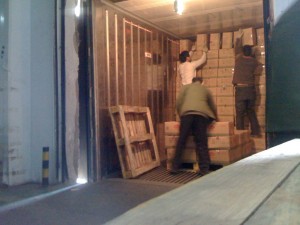In Beijing, cool profits from sub-zero storage

BEIJING -- Liu Peijun is a BMW driving entrepreneur, but at work he dresses more like an Arctic explorer. He's one of a new breed of entrepreneurs making their fortunes from cold storage facilities, which are being installed at a staggering rate across China.
Liu’s biggest warehouse, in Beijing’s Daxing district, holds 24,000 boxes of dumplings, meatballs and ice cream, and is chilled to between minus 18 and minus 20 degrees Celsius. “Our busiest time is just before Chinese New Year,” he said. “When there’s a lot of demand for dumplings,” Liu said, watching his staff unload a truckload of frozen fish balls, newly arrived from Southern China.
Liu mortgaged "everything he owned,” to set up his frozen delivery company, Kuaixin, in 2003. He now owns five warehouses in the city, which store frozen foods for all of Beijing’s major supermarket chains. Kuaixin employs around 250 staff, and turns a profit of over a million RMB per year, he said.
China built eight million square meters of storage space built nationwide this year, according to Li Wanqiu, head of Zhongde, a cold-storage consultancy based in Beijing. Beijing alone built over 50,000 square meters worth of new cold storage warehouses in 2011.
The cold-storage boom is driven by an increasing demand for frozen foods in China. China's frozen food market grew 9.9 percent annually between 2004 and 2009, according to consultancy Datamonitor, a result of growing incomes and an increase in the number of Chinese households owning freezers.

As the frozen food market expands, Chinese supermarkets are turning to companies like Liu’s Kuaixing Logistics. “Providing to supermarkets is over 80 percent of our business,” Liu said.
The expansion in cold storage is also driven by government intervention. Partly as a result of a number of food safety scandals, the Chinese government has stepped up pressure on supermarkets to ensure that frozen products are transported safely, though fines handed out to retailers are still “far below,” amounts seen in countries like the US, Liu said. Some city governments in China see the industry as a potential source of economic growth, and provide subsidies to cover up to 40 percent of the costs of building cold storage warehouses, Li said.
As with many industries in China, government owned companies still dominate the sector. “The biggest storage facilities are built by the government,” Li said. Government owned firms account for around more than half of Beijing’s frozen food transport market, according to Liu. Liu’s biggest warehouse is set to be demolished by the district government, who plan to build apartments on the land. “As private firms we’re only aloud to rent land,” he said, seeming relaxed about the prospect. “I’ll just build a warehouse somewhere else.”
On a trip from his warehouse into central Beijing for a meeting, Liu stores his thermal jacket in the trunk of a
BMW, which is usually driven by his wife, he explains.
Liu prefers to motor around in a Toyota SUV, which he took for a 40 day road trip from Beijing to Tibet last year. “I managed the warehouse by phone while I was on the road,” he said.
China’s frozen food market is expected to grow by over 30% in over the next 5 years, according to consumer research firm Access Asia, suggesting that Liu will have enough funds for a few more adventurous trips. “I don’t travel outside China much,” he said “because my English isn't good.” Liu’s new plan is to bypass the supermarkets completely, by building a website to sell frozen food from his warehouses directly to consumers.
Foreign firms are also getting a piece of the Chinese cold-storage market. The cooling equipment in Liu's warehouse is supplied by a Japanese firm, and foreign firms dominate the hi-tech end of the cold storage market, Li said.
Foreign supermarket chains also need to work with Chinese logistics firms. Liu's Kuaixin was the first company Walmart Canada's Vice President of Supply Chain management, Lesley Smith inspected when she visited China this year, Liu said. “Americans assume Chinese logistics is very backward, and that we don’t use technology like GPS,” he said. “I think she was surprised by how advanced our system is.”
Pictures: Tom Hancock.
This post was originally published on Smartplanet.com
